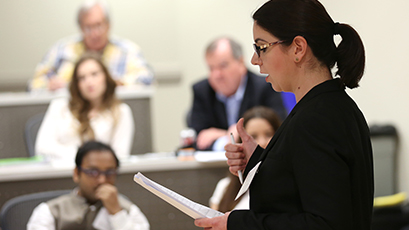Anita Cava, professor of business law, director of the School’s Business Ethics Program, and co-director of UM Ethics Programs, and Beverley Earle of Bentley University discussed the JP Morgan “Princeling” settlement, where the bank recently agreed to pay $264 million for facilitating the hiring of China’s elite in return for favors. “The quid pro quo language and exchange of favors for official acts is an environment where courts haven’t weighed in,” Cava explained. The discussion included two Supreme Court decisions – one on insider trading, the other on public corruption – to draw analogies.
Matthew Stephenson of Harvard Law School led a discussion on what enforcement of the Foreign Corrupt Practices Act (FCPA) might look like under the Trump administration. The group agreed that Alabama Sen. Jeff Sessions would be confirmed as U.S. attorney general, but expressed concern over who would be appointed to head the criminal division of the Department of Justice. That person would have great influence over how the FCPA is enforced in the coming years. An interesting discussion ensued about the role of the FBI in criminal investigations, with participants contributing different points of view.
“This administration will not be able to reach the FBI, and that will stabilize FCPA enforcement,” Stephenson predicted. “More regulatory agencies will start to poke their heads up and say FCPA is important to us, and that tends to reduce the possibility of wide swings from vigorous enforcement to non-enforcement.” Another wondered if a “Trump crony” would head FCPA enforcement and not be motivated one way or another.
Lawrence Trautman of Western Carolina University offered hope in the aftermath of the Panama Papers, a seismic event that he said proves that thanks to technological developments, there are no longer any secrets. This, he surmised, might be the great hope for world peace by encouraging uprisings from populations around the world who are downstream from bribery and corruption. “What we’ve seen so far is the tip of the iceberg,” he said. “Disclosure of information may cause political pressure to be brought upon people.”
Sometimes, an organization is so corrupt that nothing can be done until laws are changed. So said Bruce Bean of Michigan State University College of Law, who discussed alleged cases of corruption by officials connected with FIFA, the governing body of association football, futbal and beach soccer. “FIFA reform is an oxymoron,” he said. “There is no overarching government or board of directors of FIFA. We could make FIFA one of the international organizations subject to FCPA, but I don’t think it would make much difference.” Bean concluded that only the Swiss can fix FIFA, but with their 65 government sports agencies, they’re protecting a very important part of their economy and so they only say, ‘This doesn’t violate Swiss laws.’”
Other presentations centered on ways to elicit community support and bolster businesses so they can resist pressure from corrupt groups; adding sextortion to the types of corruption currency; and changing institutional structures rather than individual behavior in Nigeria, where social norms and laws encourage corrupt behavior.
How do we incentivize whistleblowers to report corruption? “Show me the money!” quipped Daniel Hurson of Hurson Law in Washington, D.C. “The SEC whistleblower program works because it’s like a Powerball lottery – a lot of people come in and not too many win anything, but there’s that incentive.”
Hurson implored the conference attendees from non-U.S. countries to return home with the notion of paying whistleblowers as is done in the U.S. “The British people say reporting it is the virtue of its own reward. That is ridiculous. It’s great to feel good about turning your company in, but when you’re destroying your career, you have to be able to pay the bills for the rest of your life.”
“We are so honored to have been able to attract thought-leaders from around the world to the Business School; papers were presented by people who traveled from Columbia, Brazil, India, the U.K, the Netherlands and Romania, as well as from around our country, representing not only academic institutions, but also the World Bank, Transparency International, and a number of major businesses,” said Professor Anita Cava “I am also proud to note that my colleagues and a number of my students attended the day and a half of discussion, which reflects a growing appreciation of the importance of this topic to economic stability and leadership in business. The feedback was so positive, we might host it again next year.”

